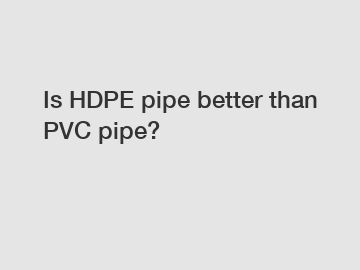Jan. 23, 2024
Rubber & Plastics
Is HDPE Pipe Better than PVC Pipe?
When it comes to selecting the right type of pipe for various applications, the debate between HDPE (High-Density Polyethylene) and PVC (Polyvinyl Chloride) remains a hot topic. Both HDPE and PVC pipes have their own unique characteristics, advantages, and disadvantages. So, which one is better? Let's explore this question and delve into the intricacies of both options.
1. Durability and Longevity:

HDPE pipes are known for their exceptional durability. This material is highly resistant to cracks, corrosion, and abrasion, making it ideal for various industries, including water supply, irrigation, and gas distribution. Unlike PVC pipes, which may degrade over time and under certain conditions, HDPE pipes can withstand harsh environments and extreme temperatures. This aspect makes HDPE pipes a reliable choice in areas prone to natural disasters or heavy construction activities.
2. Flexibility and Installation:
One of the major advantages of HDPE pipes over PVC pipes is their flexibility. HDPE pipes are highly flexible and can be easily bent, allowing for a smoother installation process around obstacles and obstructions. On the other hand, PVC pipes are relatively stiff and can pose challenges during installation, especially in confined spaces or areas with complicated layouts. The flexibility of HDPE pipes also reduces the need for additional fittings, making it a cost-effective option overall.
3. Chemical Resistance:
Both HDPE and PVC pipes exhibit excellent chemical resistance. However, HDPE pipes outshine PVC pipes in this aspect. HDPE is less reactive to chemicals, acids, and alkalis, ensuring a longer lifespan of the pipes. PVC pipes may experience material degradation when exposed to certain substances, leading to leaks or pipe failures. If your application involves transporting chemicals or corrosive materials, HDPE pipes would be the preferred choice to ensure optimal performance and long-term reliability.
4. Environmental Impact:
In today's environmentally conscious world, considering the eco-friendliness of different materials is crucial. HDPE pipes are known for their sustainability and recyclability. They can be melted down and reused for new applications, reducing waste and contributing to a circular economy. PVC pipes, on the other hand, raise concerns due to the potential release of toxic substances during manufacturing and disposal. While efforts have been made to improve PVC's environmental impact, HDPE pipes are generally considered a greener alternative.
In conclusion, both HDPE and PVC pipes have their distinct advantages and disadvantages. HDPE pipes excel in terms of durability, flexibility, chemical resistance, and environmental impact. On the other hand, PVC pipes may be more suitable for specific applications that require rigidity or cost-effectiveness. Ultimately, the choice between HDPE and PVC pipes depends on the specific needs of each project. Evaluating factors such as application requirements, site conditions, and budget constraints will help determine which type of pipe is better suited for the job at hand.
Whether you opt for HDPE or PVC, it is essential to consult with industry experts or professionals to ensure the right selection, installation, and maintenance of the pipes. Additionally, regular inspections and adherence to proper maintenance protocols will enhance the longevity and performance of any piping system, regardless of the material chosen.
Contact us to discuss your requirements of sinco engineering, high-density polyethylene Pipes for water, what is the meaning of hdpe pipe. Our experienced sales team can help you identify the options that best suit your needs.
Previous: Discover the Ultimate Uses for 3mm HDPE Sheets: Unleashing Endless Possibilities!
Next: What type of fitting is used to connect plastic pipe to steel pipe?
If you are interested in sending in a Guest Blogger Submission,welcome to write for us!
All Comments ( 0 )